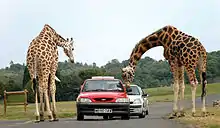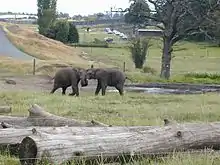West Midland Safari Park
West Midland Safari and Leisure Park is a safari park located in Bewdley in Worcestershire, England. It was opened under the name of West Midland Safari Park in spring 1973.
 Giraffes at the park | |
| Date opened | 17 April 1973 |
|---|---|
| Location | Bewdley, Worcestershire, England |
| Coordinates | 52.3754944°N 2.2882462°W |
| Land area | 200 acres (81 ha)[1] |
| No. of animals | 600[1] |
| No. of species | 165 |
| Annual visitors | 750,000+ |
| Memberships | BIAZA,[2] EAZA[3] |
| Major exhibits | African Plains, Flooded Forest, Mark O'Shea's Reptile World, Sea Lion Theatre, Land of the Living Dinosaurs, and others |
| Owner | Groupe looping |
| Website | wmsp |
The park holds over 165 species of exotic animals, among other attractions such as a small theme park. The park contains the largest groups of white lions, cheetahs, hippopotami, and meerkats in the UK, as well as the largest lemur walk-through exhibit. It was also the first park in the UK to have the African big five game animals.[1]
The park is a member of the British and Irish Association of Zoos and Aquariums (BIAZA) and the European Association of Zoos and Aquaria (EAZA). The dhole and cheetah enclosures in the drive-through safari are part of a larger heathland Site of Special Scientific Interest (SSSI) which the park is restoring.[4][5]
History
The park was opened by founder and Jimmy Chipperfield on 17 April 1973 and at the time hosted a few ex-circus animals (it had animals like rhinoceroses, elephants, ostriches, zebras, giraffes, camels, wildebeest, baboons, lions, tigers, bears & wolves, according to a video from the 1970s, date unknown). Early on, the park had a dolphin area where the sea lion theatre is today, but this was a travelling show and the dolphins were later returned to Margate. The 1970s also saw the park develop a "Boat Safari" in keeping with the fashions of the time, although this was later removed, and a narrow gauge railway through parts of the park was constructed by Severn Lamb in 1979.
The park saw its first new animal exhibit for some time with the arrival of four African white lions in "Kingdom of the White Lions" in 2004. The park was the first safari park in the UK to have all five African big game animals,[1] although its leopards have since been moved to Scotland, leaving it with only four of the five. It was also the first park/zoo in Europe to successfully breed white lion cubs and has done a great deal towards conserving the species.
In 2006, the managing directors of West Midland Safari Park officially opened the Ongava Research Centre on the Ongava Game Reserve near the Etosha National Park, their "sister park" in Namibia. The centre focuses on researching lions and rhinoceroses and carrying capacity of the reserves, which hold many rare animals. The centre has three full-time researchers[6] who work closely with Save the Rhino and the University of Cape Town.
African Plains
The African Plain is home to Southern white rhino, Common eland, ostrich, Ellipsen waterbuck, African forest buffalo, red lechwe, Burchell's zebra, Grevy's zebra, giraffe, and cape buffalo.
The Grasslands
This is home to Persian fallow deer and Barbary sheep.
Wild Woods
This is home to the dholes.
Wild Asia and Realm of the Indian Rhino
Wild Asia is home to banteng, blackbuck, Formosan sika deer, Philippine spotted deer, and barasingha. The Realm of the Indian rhino is home to three Indian rhinoceroses.
White Tiger Ridge
White Tiger Ridge is home to white tigers.
Cheetah Plains
Cheetah Plains is the UK's largest drive-by Cheetah reserve and it is home to a coalition of cheetahs.
African Wild Dog Reserve
This is home to the African wild dogs.
Realm of the Lions
This fully landscaped reserve and an off-road track opened as part of the exhibit is home to a pride of African lions.
Kingdom of the White Lions
Kingdom of the White Lion is home to a pride of rare white lions.

Eurasian Reserve and Tiger Reserve
Eurasian Reserve is home to Bactrian camel, Javan banteng, nilgai, fallow deer and Père David's deer. The Tiger Reserve is home to Bengal tigers and endangered Sumatran tigers. A drive-by enclosure at the end of this reserve is home to three gemsbok.
Elephant Valley
Elephant Valley is home to the safari's African elephants. In May 2014, the park's Elephant Valley became home to the first male African elephant successfully born through AI in the UK; he is called Sutton.
Conservation
West Midland Safari Park is known for its efforts in conservation. The park contains many animals that are on the IUCN's endangered or critically endangered list.
In May 2014, the park's Elephant Valley became home to the first male African elephant successfully born through AI in the UK.[7]
Amusement park rides
| Opened | Name | Manufacturer | Description |
|---|---|---|---|
| 1985 | "Congo Carousel" | Robert Tidman | Classic gallopers ride, operated previously at Happy Hour Amusement Park, Colwyn Bay |
| 1986 | "Jungle Swings" | A classic chair-o-plane ride | |
| 1986 | "Jungle Cat Dodgems" | I.E. Park | Cat-themed dodgems |
| 2006 | "Venom" | Fabbri | A drop tower ride similar to Detonator at Thorpe Park, but half of the train is taken off the ride. |
| 1990s | "Zambezi Water Splash" | Reverchon Industries | A standard two-drop log flume |
| 2002 | "Black Fly" | Fabbri | A frisbee ride similar to Sky-Force at Flambards Theme Park |
| 1992 | "Dr. Umboto's Catacombs" | Supercar | A ghost train ride |
| 2004 | "Jumbo Parade" | Fabbri | An elephant-themed jets ride cheaper version of Dumbo At Disneyland |
| 1983 | "Pirate Ship" | HUSS Park Attractions | A classic pirate ship ride similar to The Bounty At Drayton Manor and The Blade At Alton Towers |
| 1995 | "Hurtling Hippos" | Bakker Denies | A polyp ride, formerly named "Tarantula", "Spider" and "Cape Octopus"; operated previously at Codona's Amusement Park |
| 2006 | "Wild River Rafting" | Fabbri | A small river rapids ride |
| 1992 | "Rhinocoaster" | Vekoma | A junior rollercoaster, formerly named "Rollerskater". The park traded in their Vekoma Boomerang for the "Rollerskater". |
| 1988 | "African Big Apple" | Pinfari | An MB28 junior rollercoaster |
| 1998 | "Walls' Twister Ride" | Reverchon Industries | A spinning wild mouse rollercoaster |
| 2009 | "Shark Island" | Shenyang Chuangqi A.E. | An interactive water roundabout |
| '99/'00 | "Slippery Snake Slide" | Chris Randall | A snake-themed tube slide |
| 2014 | "Kong" | Zamperla | A Gorilla-themed Mega Disk'O |
Former rides
| Name | Opened | Closed | Manufacturer | Description |
|---|---|---|---|---|
| Cobra | 1985 | 1991 | Vekoma | A standard Vekoma boomerang replaced with the Rhinocoaster |
| Safari Express | 1979 | 2014 | Severn Lamb | a 2mm narrow gauge train that took passengers from the amusement park to the car park. Closed in 2014 to make way for the dinosaur exhibit |
Land of the Living Dinosaurs
This is the UK's largest animatronic dinosaur attraction, opened 2015
Ice Age
This is the UK's largest animatronic creator attraction, opened 2018
Discovery Trail
Discovery Trail consists of mostly indoor exhibits, and includes animal encounters throughout the day where staff allow visitors to get close to animals found in the Discovery Trail.
Animal Encounters
Animal encounters that take place in the Discovery Trail let visitors get up close and personal with small exotic creatures, under the observation of staff. Animals that take part in these encounters include ferrets, four-toed hedgehogs, gambian pouched rats, lesser hedgehog tenrecs, and long-tailed chinchillas.
Penguin Cove
Penguin Cove is home to Humboldt penguins. Their enclosure includes a pool with semi-submerged beach, sculptures, penguin house and public viewing areas.
Lorikeet Landing
This new heated indoor exhibit is home to the flock of rainbow lorikeets. The specially designed walk-through enclosure includes state-of-the-art eco-heating to help these Australasian parrots feel at home at a balmy 18*C. Lorikeet Landing provides the chance to walk amongst one of the largest flocks in the UK.
Creepy Crawlies
Creepy Crawlies is the park's insect house, and contains a small range of creepy crawlies including tarantulas, Goliath birdeater spider, leafcutter ants, locusts, Madagascar hissing cockroaches, and scorpions.
Reptile World
The park's reptile house is named after the famous herpetologist Mark O'Shea. He also makes appearances at the park, occasionally performing in the reptile encounters that take place outside the building, where guests can learn more about some of the park's reptiles. Reptiles in this exhibit include alligator snapping turtle, American alligator, amethystine python, beaded lizard, black rat snake, Borneo short-tailed python, Cuban crocodile, Eastern diamondback rattlesnake, Egyptian cobra, frill-necked lizard, green anaconda, green and black poison dart frog, green tree python, Jamaican boa, king cobra, malagasy giant hognose snake, Nile crocodile, red-eyed crocodile skink, red-eyed treefrog, red-tailed green ratsnake, reticulated python, saharan horned viper, and western diamondback rattlesnake.
Sea Lion Theatre
The Sea Lion Theatre is a 525-seat venue that allows visitors to have the chance to see the parks’ Californian sea lions performing tricks in a 25 minute show.
SeaQuarium
SeaQuarium is the park's aquarium, containing a wide variety of exotic fish. This is also the park's chain attraction. Some of the animals here include Asian arowana, Bermuda blue angelfish, chocolate chip star, clownfish, common carp, emperor angelfish, gold-spotted spinefoot, honeycomb moray, long-spine porcupinefish, orangespine, unicornfish, orbicular batfish, pangas catfish, queen coris , red-bellied pacu, red-bellied piranha, Red Sea sailfin tang, redtail catfish, redtoothed triggerfish, reef stonefish, Siberian sturgeon, small-spotted catshark, snowflake moray, spotted sailfin suckermouth catfish, spotted unicornfish, tambaqui, Vlamingii tang, white-spotted puffer and zebra moray.
Twilight Cave
The Twilight Cave is a walk-through exhibit containing free-flying Rodrigues fruit bats and Seba's leaf nosed bats. Nocturnal exhibits within this area are home to aye-ayes and Malagasy giant rats.
African Villages
Goat Walk
The African Village is an interactive walk-through area, allowing visitors to see African village wildlife and a replica African Village Home. The Goat Walk contains a walk-through area containing Cameroon sheep, pygmy goats and Somali sheep.
Meet the Meerkats
This exhibit is home to a large mob of meerkats.
Walking With Lemurs
This is the largest walk-through lemur wood in the UK, with three species of lemurs including ring-tailed lemurs, white-fronted brown lemurs, and red-bellied lemurs.
Hippo Lakes
In the amusement area are a large number of lakes. One of these has become home to the largest pod of hippos in the UK.
Addax
A large enclosure containing a large herd of addax.
References
- "West Midland Safari Park". britishzoos.co.uk. Diamond Publishing Ltd. Retrieved 30 December 2012.
- "BIAZA Zoos and Aquariums". biaza.org.uk. BIAZA. Retrieved 19 February 2011.
- "EAZA Member Zoos & Aquariums". eaza.net. EAZA. Retrieved 19 February 2011.
- "Safari Drive-Through". wmsp.co.uk. West Midland Safari Park. Retrieved 30 December 2012.
- "Conservation". wmsp.co.uk. West Midland Safari Park. Retrieved 30 December 2012.
- "Ongava Research Centre (ORC) & Namibian Wildlife Conservation Trust (NWCT)". wmsp.co.uk. West Midland Safari Park. Retrieved 30 December 2012.
- "New Baby Elephant Named!" (Press release). Bewdley, Worcestershire: West Midland Safari Park. 12 June 2014. Retrieved 12 June 2014.
